

The Volunteering for Development (VfD) programme was a multi-year grant from the UK government, worth £70.5 million in total over the course of five years (2017-22). It funded programmes in health, education, livelihoods, resilience and active citizenship across 24 countries in Africa and Asia, and reached over 5 million people living across the Global South, twice the original target.
For every year of its implementation, the VfD programme received at least an A rating from the UK government for the quality of its delivery. We are hugely proud of the achievements of the VfD programme, and look forward to building on its successes with through out new ACTIVE grant.
Our Volunteering for Development programme, funded by the UK’s Foreign, Commonwealth and Development Office (FCDO), works to improve access to quality health and education services, as well as developing livelihood opportunities for the most poor and vulnerable.
Originally designed to provide targeted support over three years, between 2017-20, the programme was extended for an additional year in 2020, and then again in 2021, before coming to a close in March 2022. The programme supported a range of programmes, from reducing child marriage in Bangladesh, to providing education in refugee camps, to supporting communities to recover from natural disasters, such as Cyclone Idai in 2019.
The VfD programme also supported the development, launch and widespread adoption of a global set of minimum standards for responsible and impactful volunteering, known as the Global Standard for Volunteering. Almost 200 volunteer-sending organisations around the world signed up to the standards which promote safe and impactful volunteering.
Through VfD funded policy and advocacy work, VSO also facilitated numerous changes to local and national policies across countries in the Global South. These included helping to shape a new Disability Act in Pakistan, supporting ordinary Ethiopians to get involved in their own country’s development plans, and supporting citizens to hold their own governments to account on progress towards the SDGs.
What we achieved
We delivered improved health, education and livelihoods outcomes for over five million of the poorest and most marginalised people across 24 developing countries – more than twice the original target
We enhanced the effectiveness of at least 350 partner organisations, shaping more relevant, appropriate and inclusive basic services.
We mobilised a global volunteer alumni network of more than 5,000 former VSO volunteers and professional bodies to champion volunteering as a tool to help deliver the SDGs and the UK Aid strategy.
Key aims of the programme
Advocacy
Mobilising poor and marginalised groups to give them a voice and to hold duty bearers to account, to monitor development progress and ensure that policy makers consider their needs.
Volunteer standards
Develop and drive the widespread adoption of a global set of minimum standards for responsible and impactful volunteering.
Building capacity
Enhance the practices and effectiveness of 350 partner organisations and more than 4,000 expert volunteers to extend the reach of basic services to the poorest and most marginalised.
Areas of impact
The grant enables us to drive vital work across several development areas. This joined-up approach sees changes happening at all levels to bring real change to the world’s most poor and marginalised.
The grant supports VSO to place expert volunteers to support projects in 23 countries around the globe. Throughout the course of the grant we aim to have supported 4,000 volunteers.
After year one, we placed 606 international volunteers and 920 national volunteers across our four areas of focus.
Volunteering for Development supports our vision to enhance effectiveness across a number of vital areas - including our three 'core approaches':
The grant also supported work to improve the standards of volunteering across the sector.
Key achievements of the VFD grant
- Delivering improved health, education and livelihoods outcomes for over five million of the poorest and most marginalised people across 24 developing countries – more than twice the original target
- Enhancing the practices and effectiveness of at least 350 partner organisations and shaping more relevant, appropriate and inclusive basic services, resources and opportunities through mobilisation of nearly 6,500 skilled volunteers in 24 countries
- Mobilising a global volunteer alumni network of more than 5,000 former VSO volunteers and professional bodies to champion volunteering as a tool to help deliver the SDGs and the UK Aid strategy.
- Developing and driving the widespread adoption of a global set of minimum volunteer standards across the rapidly growing, but still unregulated volunteering sector. The Global Standard for Volunteering for Development, developed in conjunction with over 100 volunteering bodies, has positioned the UK at the forefront of global practice and helps to maintain the UK’s position as a global leader in international development thinking and practice.
- During the COVID-19 pandemic. VSO was able to rapidly (within 10 days) repurpose 85% of the programme activities in support of the ongoing COVID-19 response in conjunction with national governments in 18 countries.
Volunteering for Development around the world
The Volunteering for Development grant is supporting work in 23 countries across the globe.

Social inclusion and gender equality
All our programmes are underpinned by a rigorous social exclusion and gender analysis. As a lead partner on the Leave No One Behind initiative, we are committed to inclusivity in all we do.
The Volunteering for Development grant directly contributes to reducing social inclusion and gender disparity by addressing existing educational, health and livelihoods inequalities.
Within its first year, Volunteering for Development enabled 35 social inclusion and gender specialist volunteers to bring their expertise to programmes worldwide.
Highlights from our work on the ground:
- In the first year of Volunteering for Development, we reached 847,000 women and girls - representing 60% of our total reach. 13,601 (1%) had a disability.
- Bangladesh and Tanzania - challenging traditional gender perceptions: Working alongside Theatre for a Change we are using drama to interact with communities and challenge perceptions of standard gender norms.
- Bangladesh - reducing child marriage: We are working alongside the Girls Not Brides campaign to monitor the implementation of the Child Marriage Act, which was passed in 2017.
- Sierra Leone - tackling gender-based violence: Reported incidents of gender-based violence have halved in Kenema, Sierra Leone, where we're working with local volunteers to work as male advocates and peer health educators. A film covering this project was selected for the Sustainable Development Goals Film Festival at the 2018 UN High Level Political Forum.
Highlights from our work influencing policy:
- African Union Gender strategy: 600 Million women and girls now have a clear actionable roadmap on gender, including an investment plan and an advocacy tool. VSO emphasised the need for an inclusion lens in the African Union’s approach to gender equality and women’s empowerment.
- Kenya - Policy for learners and trainees with disabilities: (formerly Kenya special education needs policy). Launched by the President of Kenya in July 2018. VSO was central to the initiation and subsequent development of this policy and accompanying guidelines. The guidelines accompanying the policy have formed the basis for the development of the National Education Sector Strategic Plan 2018-2022.
- Malawi - developing by-laws and reporting systems on child marriages: in 14 group villages.
- Nepal - National guidelines on violence against women and girls: For the first time, clear public guidelines are provided about the services and support provided by the government to women and girls who have experienced discrimination. A VSO national expert volunteer co-drafted the policy.
Case studies from our work in social inclusion and gender equality

Combatting gender-based violence through democratic policing
Working with the police force, NGOs and civil society organisations to combat gender-based violence, and challenge longstanding attitudes towards harmful cultural practices in Pakistan.
Ensuring Deaf young people aren't excluded from sexual and reproductive health services
Improving sexual and reproductive health and rights for marginalised and at-risk Deaf young people.
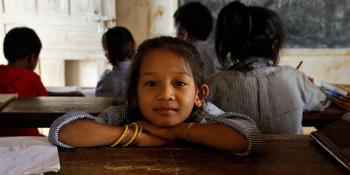
Sisters for Sisters' Education
Supporting vulnerable girls to succeed in school – and beyond.

Strengthening resilience and responding to crises
Building resilience to shocks and stresses is vital in ensuring sustainable advancement from poverty. During its first year, the Volunteering for Development grant enabled us to recruit 17 resilience specialist volunteers to provide support to programmes worldwide.
The grant has also enabled us to respond to natural disasters and work with partners to build resilience and enhance disaster risk reduction.
Highlights from our work on the ground:
- Bangladesh - education interventions for Rohingya refugee children: we have implemented Home Based Early Childhood Education and Care for 3-5 year olds and child-friendly alternative learning classes for 6-14 year olds.
- Ethiopia - education interventions for refugee children: In partnership with UNICEF, we are developing a psychosocial support programme in Oromia and Somali regions of Ethiopia to directly support vulnerable primary school children.
- Nepal - flood recovery: We are working alongside a selection of partners to support rehabilitation and improving access to schools in addition to ongoing disaster risk reduction work.
- Sierra Leone - flood and mudslide recovery: Continued focus on the shift from emergency response to recovery and resettlement. Through the flood response programme, technical support has been provided to the Disaster Management Department of the office of National Security and training for over 50 community volunteers to be engaged in future Disaster Risk Reduction campaigns in the Provincial districts of Kono, Pujehun, Bo, Koinadugu and Kambia.
Highlights from our work influencing policy:
- Nepal - Disaster Risk Reduction Strategy: The government of Nepal has drafted a national disaster risk reduction strategy with support from the Association of International NGOs. VSO supported with technical expertise and organised public consultations with local communities to ensure accountability. We will also support the monitoring and implementation of the strategy.

Social accountability and citizen-led monitoring
Our programmes facilitate local ownership of development processes and build citizen-led accountability. Within its first year, Volunteering for Development enabled 36 social accountability specialist volunteers to bring their expertise to programmes worldwide.
Highlights from our work on the ground:
- Citizen-led monitoring introduced across six countries: This work has reached over 30,000 citizens and there is significant increase in the awareness of the Sustainable Development Goals among these communities.
- In Tanzania, 1453 young people across Lindi and Mtwara are actively involved in youth platforms, actively building youth networks with strong leadership skills to lead their own development, monitor progress and take action.
- In Uganda, 3,456 community members and 3,426 school children have been involved with communications around the SDGs and social accountability.
Highlights from our work influencing policy:
- Ethiopia - National Youth Volunteering Policy: completion of a National Youth Volunteering Policy and adoption by parliament; the National Civil Society Organisations (CSO) Policy amended to provide significant level of political space for CSOs to engage in rights, policy and advocacy issues.
Case studies from our work in social accountability
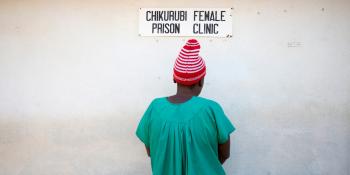
Using scorecards to improve accountability for health in Zimbabwean prisons
We've been working with the Zimbabwe Prison and Correction Services (ZPCS) to empower inmates to identify areas of improvement in prison health services - and hold authorities to account where they fall short.
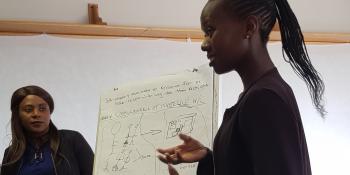
Improving sexual and reproductive health services for young people in Lesotho
We've partnered with the Ministry of Health to improve young people's access to sexual and reproductive health information and services, whilst supporting a citizen-led monitoring approach that holds authorities to account.

Thought leadership on volunteering in development
We are developing and driving the widespread adoption of a global set of minimum volunteer standards across the rapidly growing, but still unregulated, volunteering for development sector.
We presented at the annual meeting of European members of the International Forum for Volunteering in Development, conducted a session on volunteering standards at the Tropical Health and Education Trust (THET) Conference 2018, and hosted the International Volunteer Cooperation Organisations (IVCO) Conference 2019, in collaboration with the International Forum for Volunteering in Development.
The group leading volunteering standards continues to expand its membership. We have recently added organisations with a focus on volunteering in institutional settings and a number of ‘volunteerism’ organisations, as well as UN Volunteers.
We have established a working partnership with the Institute for Development Studies (IDS) to support our work developing standards for volunteering.
Where we work
The Volunteering for Development grant is supporting vital work across the globe. Find out more about our work using the map:
Bangladesh
Livelihoods
-
Growing Together in Bangladesh
-
Youth Empowerment for Social Cohesion (YESC)
Education
-
Early Childhood Care and Education (ECCE) in Bangladesh
Health
-
Interactive theatre for justice
Malawi
Education
-
Unlocking Talent Through Technology
-
Building Educational Foundations through Innovation and Technology (BEFIT)
Livelihoods
-
Improving Market Access for the Poor
-
Solar Mama Rural Electrification project
Health
-
Improving the health and wellbeing of prison populations in Southern Africa
Tanzania
Livelihoods
-
Improving Market Access for the Poor
-
Lake Zone Youth Empowerment project
-
Tanzania Local Enterprise Development (T-LED)
-
Collective Action for Rights Realisation in Extractives Industry (CLARITY)
-
Futuremakers
Health
-
Interactive theatre for justice
Find out more about our work in:
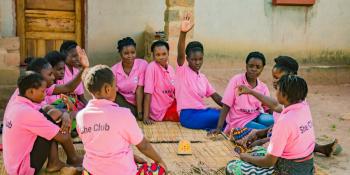
Adolescent and youth health and wellbeing
Improving health services and empowering people to exercise their right to quality care.
We helped almost 90,000 people access better healthcare in 2022-23.
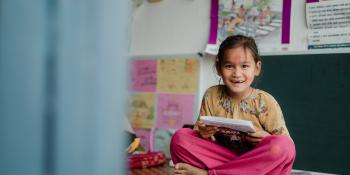
Inclusive education
Making sure everyone gets the skills they need to live a fulfilled, dignified life.
We helped over 3.2 million people to access the quality education they deserve in 2022-23.
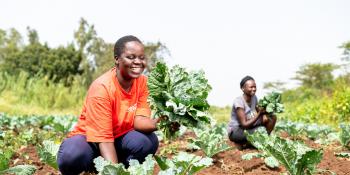
Resilient livelihoods
Ensuring people have the skills and opportunities needed to support themselves and their families.
200,000 people benefited from our work supporting livelihoods in 2022-23.
